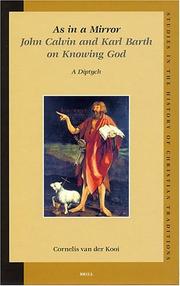| Listing 1 - 1 of 1 |
Sort by
|

ISBN: 900413817X 9786610859894 1429426985 9047405226 128085989X 1433703858 9789004138179 9781429426985 9781433703850 6610859892 9789047405221 Year: 2005 Volume: 120 Publisher: Leiden Brill
Abstract | Keywords | Export | Availability | Bookmark
 Loading...
Loading...Choose an application
- Reference Manager
- EndNote
- RefWorks (Direct export to RefWorks)
What does it really mean, to know God? What are the grounds for knowing God, what feeds that knowledge, and what is really known? In his search for answers to these questions, in two panels the author paints for us a clear picture of what Calvin and Barth had to say about knowing God: Calvin against the background of pre-modern culture, Barth in response to a post-Kantian culture inclined to agnosticism. Between them, like a hinge between the two panels, we find the philosophy of Kant. The two epochal theological figures are placed next to each other, but without this being at the expense of the power of either. The study does not stop with detached historical analysis, but nourishes the author's own reflection toward a systematic design.
231.133.11 --- 2 BARTH, KARL --- 2 CALVIN, JEAN --- 231.133.11 Kenbaarheid van God --- Kenbaarheid van God --- 2 CALVIN, JEAN Godsdienst. Theologie--CALVIN, JEAN --- Godsdienst. Theologie--CALVIN, JEAN --- 2 BARTH, KARL Godsdienst. Theologie--BARTH, KARL --- Godsdienst. Theologie--BARTH, KARL --- God (Christianity) --- Christianity --- Trinity --- Knowableness&delete& --- History of doctrines --- Barth, Karl, --- Calvin, Jean, --- Calvijn, Johannes --- Calvin, Jean --- Calvinus, Johannes --- Parŭtʻŭ, Kʻal, --- Barth, Karol, --- Barŭtʻŭ, Kʻal, --- Barŭtʻŭ, --- Bate, --- בארת, קרל, --- カール·バルト, --- 巴特, --- Contributions in knowableness of God --- Barth, Karl --- God --- Knowableness --- History of doctrines. --- Godsleer --- Godsleer.
| Listing 1 - 1 of 1 |
Sort by
|

 Search
Search Feedback
Feedback About UniCat
About UniCat  Help
Help News
News